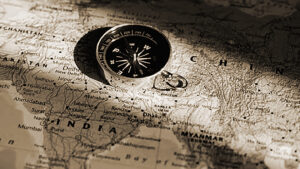How Boeing And Airbus Control The Entire World’s Airspace
June 15, 2024: We love to call the sky open and free. We think the sky is the only place that’s beyond anybody’s control. Well, we only think so. In reality, the sky is actually not so open and free. It is a private space – a private club of two corporate players.
Did you know that just two companies literally control the entire airspace above us? They are Boeing and Airbus: two biggest producers of passenger airplanes. In this special report, we will tell you the incredible story of these two Western aerospace companies. And how the two giants single-handedly control the airspace from America, to Europe, to India, to China.
Can you guess how many commercial planes are flying in the sky right now? Something in the range of 7,700 to 8,700 passenger jets are currently up in the air as you’re reading this report.
And do you know how many passenger aircraft there are in the world today? – that’s 28,398, as per the latest data. Ten years from now, the number is expected to cross 35,000. Most of the world’s commercial aeroplanes fly in Asia, followed by North America, and then Europe.
The airspace above Asia alone has a total of 7,600 passenger jets operating. For North America, the number is 7,300. For Europe, it is 5,900.
At any time of the day, when you look at the sky and spot a commercial plane, chances are 99% that it’s either a Boeing or an Airbus. Recall the last few times you travelled by air. What aircraft did you board? You may not have noticed it. It was most likely either Boeing or Airbus. In fact, all the air travel you’ve done in your life is highly likely to have happened only on these two brands of planes.
Boeing is an American aerospace and defence company. Its one and only rival, Airbus, is a European aerospace and defence company. Together, these two companies have a very, very tight grip on the global market for passenger planes.
Duopoly in the sky
It is surprising and intriguing that there are so many countries, so many airports, and so many airline companies on the planet, but only two commercial plane-makers can be spotted everywhere – Boeing and Airbus. These two giants are constantly competing with each other for the No.1 spot. But at the same time, together they strictly control the entire industry.
The Boeing-Airbus combined presence in the air is a classic case of duopoly. A duopoly is a situation where only two gigantic companies control the entire market share. Usually in a duopoly, two companies are caught in a bitter race to increase their market share and outplay each other. But sometimes, they also work together on certain tactical and strategic fronts. They quietly come together when it comes to setting the agenda for the industry, such as establishing the minimum price for their products, carving out exclusive jurisdictions or markets, etc.
Let’s look at a few famous cases of duopoly. Take the Indian marketplace, for example. The Ola vs. Uber fight is a classic case of duopoly out on the streets. In the delivery business, there’s the big rivalry between Amazon and Flipkart. Then you have the Swiggy-Zomato market domination for food delivery. Even more famous is how Jio and Airtel control the country’s telecom sector. Also, there’s the non-stop cola war between Coca-Cola Company and PepsiCo.
There are some big examples on the international front as well. There’s the case of Google Android and Apple iOS controlling 99% of the market share of mobile operating systems. Another famous one is the market for operating systems for desktop computers. It is controlled by only Windows and Apple Mac. There are no other players in the scene.
There are more examples, such as the credit card market, which is controlled by rivals Visa and Mastercard. Then before Chinese mobile phones flooded the global market, Apple and Samsung enjoyed a duopoly for a long period of time.
What do these cases of duopoly tell us? What’s the hallmark of these duopolies? Absolute control of an entire marketplace by just two sellers. It’s like living in a large country where two rival dictators control the entire population. And there’s no choice. The people have to accept the two dictators, and suffer the consequences when they fight with each other.
Airspace of China, Russia
Despite there being a global market for nearly 29,000 commercial planes, only Boeing and Airbus bag almost all the orders. The mainstream media repeatedly gives you the impression that the Western world and China are at war. And that Russia and America are bitter enemies who can never work together. But if you closely look at the high-profile industry of passenger planes, you will discover that there’s actually no war. The entire world’s airspace, including China and Russia, is controlled by America’s Boeing and Europe’s Airbus.
Here are some facts that will surprise you. As of 2017, passenger airline companies in China operated 1,552 Airbus jets. At that time, US passenger airline operators had 1,329 Airbus planes. So, there were more Airbus planes in Chinese airspace than there were in the American sky that year.
It’s the same story with Russia as well. Their biggest airline company is Aeroflot, which is often assumed to be an authentic Russian airliner. But most people don’t notice that the airline company operates only Boeing and Airbus passenger jets. It has 119 Airbuses and 59 Boeings. Aeroflot doesn’t fly a single Russian-made plane.
Let’s look at the scene in India. The latest data shows us that all the Indian airline companies together have 771 passenger planes in service. Almost all of them are manufactured by these two Western corporate giants. There are almost 500 Airbus commercial planes in India’s airspace. And there are about 170 Boeing passenger jets flying above us.
Which are some of India’s prominent airline companies? Indigo, Air India, Vistara, Akasa Air, Spice Jet, Go First, and Air Asia. Well, all of them own the bulk of the 771 Boeing and Airbus passenger aircraft that are operated in India. You’ll not see any large passenger jet in the Indian sky that’s manufactured by a domestic brand. You’ll spot many small locally made passenger planes, but not big ones.
The Iran example
That’s the case with almost each and every country in the world today. Take Iran, for example. We’re told that Iran is in a state of a perpetual diplomatic war with the US. Now, if you look at the Iranian airspace, you’ll find that a vast majority of the domestic commercial jets are Airbus and Boeing.
In fact, Iranian airline companies are struggling to fly the Boeings and Airbuses they have. The planes are getting old and need servicing or replacement, but Iran is blockaded by the US-led West from buying spare parts from the outside world for its Boeing-Airbus jets due to diplomatic sanctions. It is ironic that amid a diplomatic stand-off with the US government, Iran’s aviation industry desperately wants the latest Boeings and Airbuses.
Is there really any exception or is it just a Boeing-Airbus show all over the planet? Well, there’s one exception – it’s North Korea. The country has only one airline company called Air Koryo. It is a state-owned company headquartered in Pyongyang.
Air Koryo doesn’t have a single Boeing or Airbus passenger jet. But interestingly, it doesn’t build and fly locally made commercial planes. Instead, the North Korean airliner flies only Russian-made and Ukrainian-made passenger airplanes. The Russian aircraft brands used in North Korea are Ilyushin and Tupolev. The Ukrainian passenger plane brand in operation there is Antonov.
So, North Korea is the only real exception. The country’s government and aviation industry don’t entertain Airbus and Boeing. Is that one of the reasons why the Western media always portrays a negative picture of North Korea? Is that why Kim Jong Un is always shown as a joker and a dictator, and the country is always projected as a rogue nation?
Let’s come back to the numbers once again for a clear picture of the power and influence of the Boeing-Airbus duopoly. We know that the total number of passenger jets in the world is 28,398. So, who is the No.1 manufacturer, Airbus or Boeing? It is Airbus with 12,743 passenger jets currently in service all over the world. Boeing is No.2 with 10,965 passenger planes in service. The rest are nothing compared to these two Western giants.
A Brazilian plane-maker called Embraer has 1,466 passenger jets in service. But that’s a very small number compared to a vast number of Boeings and Airbuses flying in Brazil’s airspace. Russia has three domestic plane-makers: Ilyushin, Sukhoi, and Tupolev. But together, they have only 182 commercial planes in service. Most of Russia’s sky is taken over by Airbuses and Boeings.
The curious case of China
What about China, which, as we’re told by the mainstream media, is fighting a diplomatic and economic war with the West? There’s a domestic Chinese aircraft-maker called Comac. It has only 127 passenger jets in service. Comac’s market share inside China is dwarfed by the presence of Airbuses and Boeings. Then there’s the Ukrainian commercial plane-maker called Antonov, which only has eight aircraft in service. It’s a drop in the ocean for Ukraine, where Boeing and Airbus control the sky.
It’s important for you to understand this full-spectrum domination of Boeing and Airbus. No duopoly is good for society and the economy, especially when it involves enormous MNCs (multinational companies) in a high-profile industry.
Think about what will happen to global transactions if, one fine day, Visa and Mastercard together decide to freeze all operations for just 24 hours. There will be a panic in the markets, followed possibly by a global economic crash. What if Jio and Airtel together decide to freeze all their services for one whole week in India? All long-distance communication inside India will collapse completely. And what if Google Android and Apple iOS suddenly stop functioning? A majority of the world’s mobile phones will just stop working.
Of course, Boeing and Airbus will never pair up to do something like that, such as seizing operations. In fact, they can’t do that. That’s because they sell their planes to airline companies that operate all the flights. Boeing and Airbus themselves have no direct control over civil flight operations. There are hundreds of airline companies out there, big and small. At the most, the plane-makers can stop sharing spare parts.
But they actually did that, though, with Ukraine and Iran in order to put diplomatic pressure on them. The problem with this duopoly is, if any country refuses to listen to America, Boeing and Airbus can stop sharing spare parts and operational knowhow. That’s the core problem with duopolies, monopolies, and oligopolies. With concentration of power comes the scope and tendency to use that power at will.
Thankfully, there is no duopoly or monopoly when it comes to airline companies. There is no such duopoly also in the aviation fuel supply industry. Exxon Mobil, Shell, Chevron, British Petroleum, and TotalEnergies are the world’s five main aviation fuel sellers. Even though five companies are not a lot, at least it’s not a monopoly or duopoly.
The deeper concern
There is a deeper concern with the Boeing-Airbus duopoly. These two companies are originally giants of the aerospace and defence industry. In the last 110 years, the planet has seen two devastating World Wars and dozens of military invasions and conflicts. They were mostly carried out by Western forces.
These 110 years of conflict have repeatedly proved that the defence sector is one of the most powerful industries in the world. It is as powerful as the banking, pharmaceutical, and agri-food industries. By powerful, we mean dangerously powerful. Effectively, the civilian passenger jet market is controlled by two enormously big defence companies.
Let’s have a close look at who these two companies are. We’ll start with Airbus. It’s so big that it’s not based in a single country. Airbus is a pan-European company owned by EADS, or European Aeronautic Defence and Space Company.
EADS is a major European aerospace and defence company that builds a lot of things. Apart from passenger jets, it makes military aircraft, space systems, and missiles. The Airbus company in its current form was created in 2000. But its origin goes back to 1970. Since then, six European aerospace companies merged one after another to become today’s Airbus.
Airbus has major offices and manufacturing plants in France, Netherlands, Spain, Britain, and also in Canada, China, and the US. Its owner EADS has twin headquarters, in Paris and Munich. French businessman Guillaume Faury is the CEO of the company that employs 1.48 lakh people. Last year, Airbus reported a revenue of 66 billion euros. There are five types of Airbus passenger jets in the market: A320, A220, A330, A330neo, and A350. Among them, A320 is the most widely sold. There are 10,314 A320s in service right now globally.
Let’s now look at Boeing. It’s a purely American MNC. It designs, manufactures, and sells airplanes, helicopters, rockets, satellites, and missiles. The company was created 107 years ago by businessman William Boeing in Seattle. It is now headquartered in Arlington County in Virginia. It has factories in the states of Washington and South Carolina.
Last year, the company recorded a revenue of $78 billion. Boeing employs 1.7 lakh people and is led by CEO and president David Calhoun, a US businessman. There are four types of Boeing passenger aeroplanes in service now; the rest are out of production. They are 737, 767, 777, and 787 Dreamliner. Boeing 737 is the most common model, with 7,649 aircraft units in service today.
As you can see, both companies are huge. They are much larger and more powerful than many countries and governments. Now, the question is, how did they become so big in the first place? The answer lies in one simple word: mergers.
Since their origin, these aerospace and defence companies have repeatedly swallowed up competitors and merged with rivals. That’s how they became bigger and bigger over time. For Boeing, a big breakthrough came in 1997 when it swallowed its bitter rival, McDonnell Douglas. Once Airbus and Boeing grew in size due to mergers, other manufacturers faded out of competition in the passenger jet business. Lockheed Martin, Convair, BAE Systems, and Fokker – they were no longer able to compete with Airbus and Boeing.
Do we have instances of Boeing and Airbus flexing their muscle power, or fishing in troubled waters? Well, they do face such allegations from time to time, even though the two companies deny any wrongdoing or bad intentions. Boeing has often been reported to be profiting from war.
The US company allegedly played a negative role in the deadly civil war in Yemen going on for 10 years now. Here are some disturbing details. By 2019, Boeing reportedly made $21 billion by selling 6,000 missiles, 82 Apache helicopters, and 84 fighter jets to Saudi Arabia for the war in Yemen. Apart from war, Boeing is also known to influence US politics. It is reported to have bankrolled Barack Obama’s presidential campaign in 2008. The same Obama who later turned out to be a warmongering US president.
Airbus also faces similar accusations. Airbus is owned by the company EADS. It has been reported that EADS manufactures and sells deadly cluster bombs. More than 120 countries have signed an international law to ban cluster bombs, they’re so harmful. These bombs can indiscriminately kill a high number of civilians when used in a war. And the company owning Airbus reportedly used to produce these cluster bombs.
There are many research and investigation bodies out there that have detailed lists of companies that profit from wars and invasions. Boeing and Airbus owner EADS consistently feature on those lists.
So, how safe is it really for civil society to allow only two powerful Western defence companies to control the entire airspace? We’re often told via multiple sources that Boeings and Airbuses are very safe planes to fly on. That’s true and understandable because with the kind of deep pockets they have, only they can afford the elaborate and costly R&D required to produce safe aeroplanes.
But this report is not about flight safety. It is about concentration of corporate power. It is about only two plane-makers handling millions of passengers flying every day. Outside of North America and Europe, the two hubs of Boeing and Airbus, only five countries produce their own brand of passenger planes. And they are very, very few in number. They are Brazil, China, Russia, Ukraine, and North Korea. Their passenger aircraft brands are nowhere near the market share of Boeing and Airbus.
Question is: is it normal to have a passenger jet market that is so duopolistic and disbalanced? Is it a free and healthy market where only two big shots call all the shots? Next time when you spot an aeroplane in the sky or board a flight, take note of which company’s aircraft it is. After seeing this report, you can already guess it’s going to be one of these two names.
COPYRIGHT & REPUBLISHING TERMS:
All rights to this content are reserved with Empire Diaries. If you want to republish this content in any form, in part or in full, please contact us at writetoempirediaries@gmail.com.








